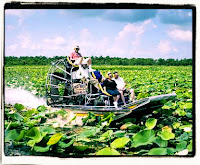Influencing: Learning from the Everglades Airboat Case
Since the 1940's the characteristic airboats of the Florida Everglades have been carrying tourists and hunters through the grassy swamplands of the state's southern tip. But when the Everglades National Park was expanded by a new law in 1989 there was a provision calling for the use of airboats to be phased out to reduce damage to the park ecosystem.
Restricting any popular activity is complicated because many people will oppose the ban, and in any democratic regime opposition will at the very least delay plans if not actually derail them.
Dealing with opposition is the key problem in any influencing case and the Everglades Airboat Case is no exception. If the regulators simply ban the use of airboats in the expanded park area where people have been airboating for decades they can expect some vocal opposition. What they have chosen to do is instructive and an interesting lesson for students of influencing.
According to reports in the media, the way that the law will be implemented is to restrict airboat use to anyone who was over 16 and a regular user in 1989. Any of those airboat users who apply now will be given a lifetime permit that expires when they die and then no more permits will be issued. As nature takes its course the number of permits and thus the number of permits will gradually decline, achieving the gradual phase out included in the 1989 law.
This approach cleverly turns the only likely opponents into allies. When anyone is trying to sell an idea it is often the opponents that decide the day. Even if you have many people on your side just a few opponents -- sometimes just one -- is enough to block your plans. In theory airboat operators are likely to be opposed to the restrictions, but by giving them permits you turn them into allies -- in return for accepting that their descendants won't be riding airboats they obtain a lifetime permit.
Turning opponents into allies is one of the most effective influencing techniques available and it has been used in many cases. Stockholm's congestion charge, for example, was implemented partly thanks to the very clever move of exempting car rental and taxi companies -- two lobbies that would otherwise have opposed the scheme. Not only did that eliminate their opposition it also turned them into positive allies, since by reducing private traffic it benefited their businesses.
What we can learn from the Everglades Airboat Case is that at the heart of effective influencing there is the analysis of the landscape identifying the players and bringing opponents onto your own team, or at least to dial down their opposition. A little creativity in doing this will solve the most challenging influencing problems.
Lectures, Workshops, Coaching and Writing
For lectures, workshops, one-to-one coaching and writing about Influencing and other topics you can contact the author Andrew Hennigan on 0046 730 894 475 or 0033 6 79 61 42 81 and by email at speaker@andrewhennigan.com.
Restricting any popular activity is complicated because many people will oppose the ban, and in any democratic regime opposition will at the very least delay plans if not actually derail them.
Dealing with opposition is the key problem in any influencing case and the Everglades Airboat Case is no exception. If the regulators simply ban the use of airboats in the expanded park area where people have been airboating for decades they can expect some vocal opposition. What they have chosen to do is instructive and an interesting lesson for students of influencing.
According to reports in the media, the way that the law will be implemented is to restrict airboat use to anyone who was over 16 and a regular user in 1989. Any of those airboat users who apply now will be given a lifetime permit that expires when they die and then no more permits will be issued. As nature takes its course the number of permits and thus the number of permits will gradually decline, achieving the gradual phase out included in the 1989 law.
This approach cleverly turns the only likely opponents into allies. When anyone is trying to sell an idea it is often the opponents that decide the day. Even if you have many people on your side just a few opponents -- sometimes just one -- is enough to block your plans. In theory airboat operators are likely to be opposed to the restrictions, but by giving them permits you turn them into allies -- in return for accepting that their descendants won't be riding airboats they obtain a lifetime permit.
Turning opponents into allies is one of the most effective influencing techniques available and it has been used in many cases. Stockholm's congestion charge, for example, was implemented partly thanks to the very clever move of exempting car rental and taxi companies -- two lobbies that would otherwise have opposed the scheme. Not only did that eliminate their opposition it also turned them into positive allies, since by reducing private traffic it benefited their businesses.
What we can learn from the Everglades Airboat Case is that at the heart of effective influencing there is the analysis of the landscape identifying the players and bringing opponents onto your own team, or at least to dial down their opposition. A little creativity in doing this will solve the most challenging influencing problems.
Lectures, Workshops, Coaching and Writing
For lectures, workshops, one-to-one coaching and writing about Influencing and other topics you can contact the author Andrew Hennigan on 0046 730 894 475 or 0033 6 79 61 42 81 and by email at speaker@andrewhennigan.com.



Comments